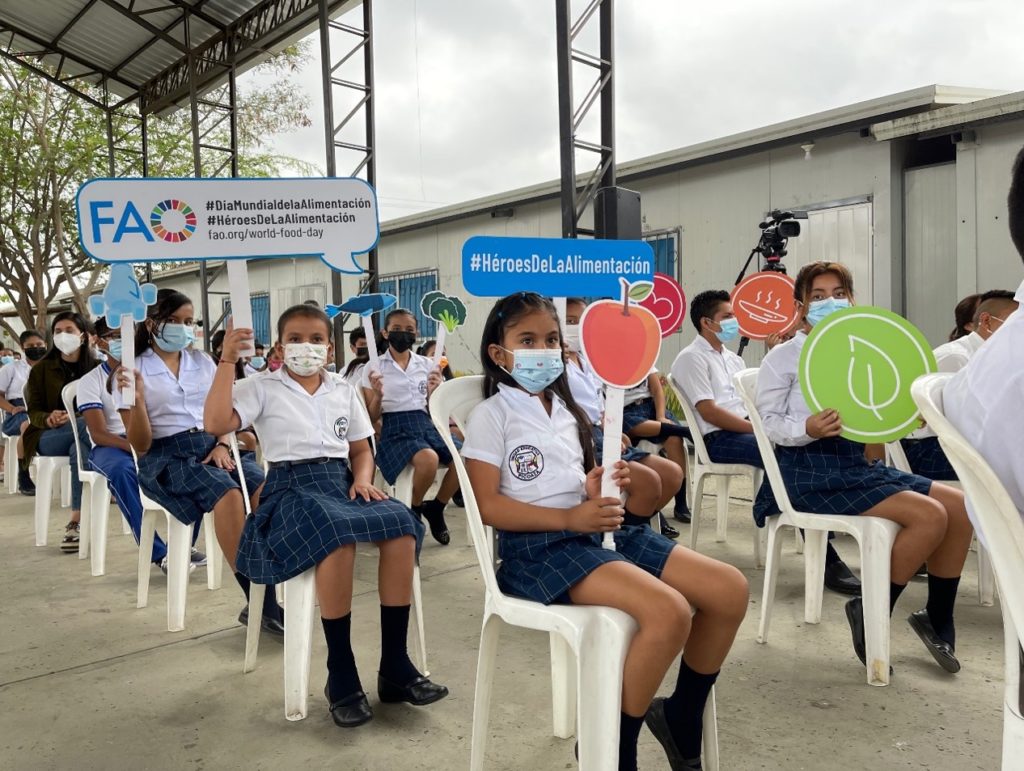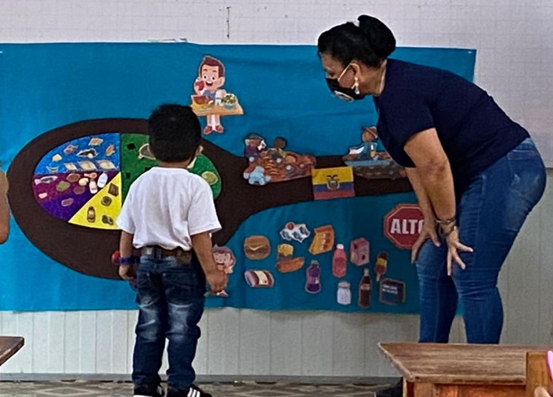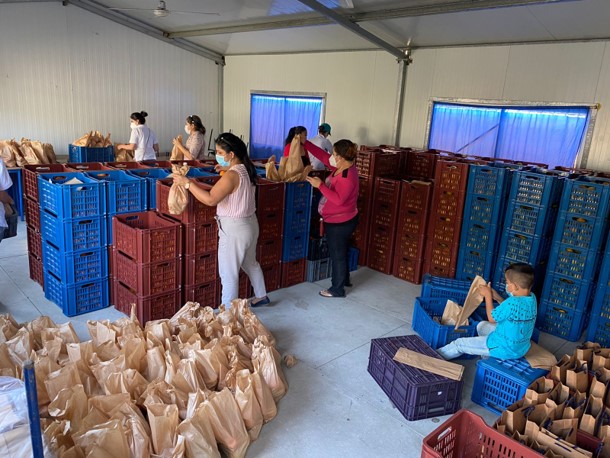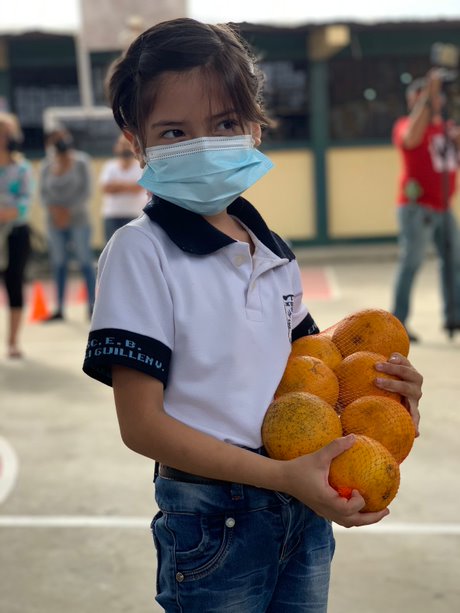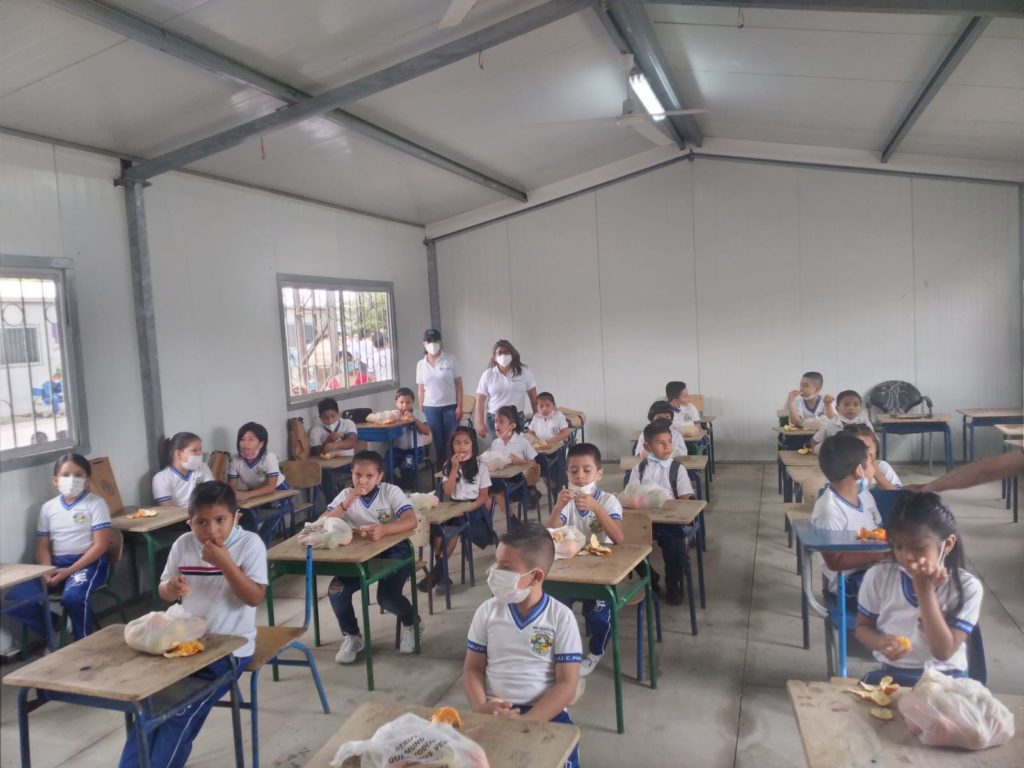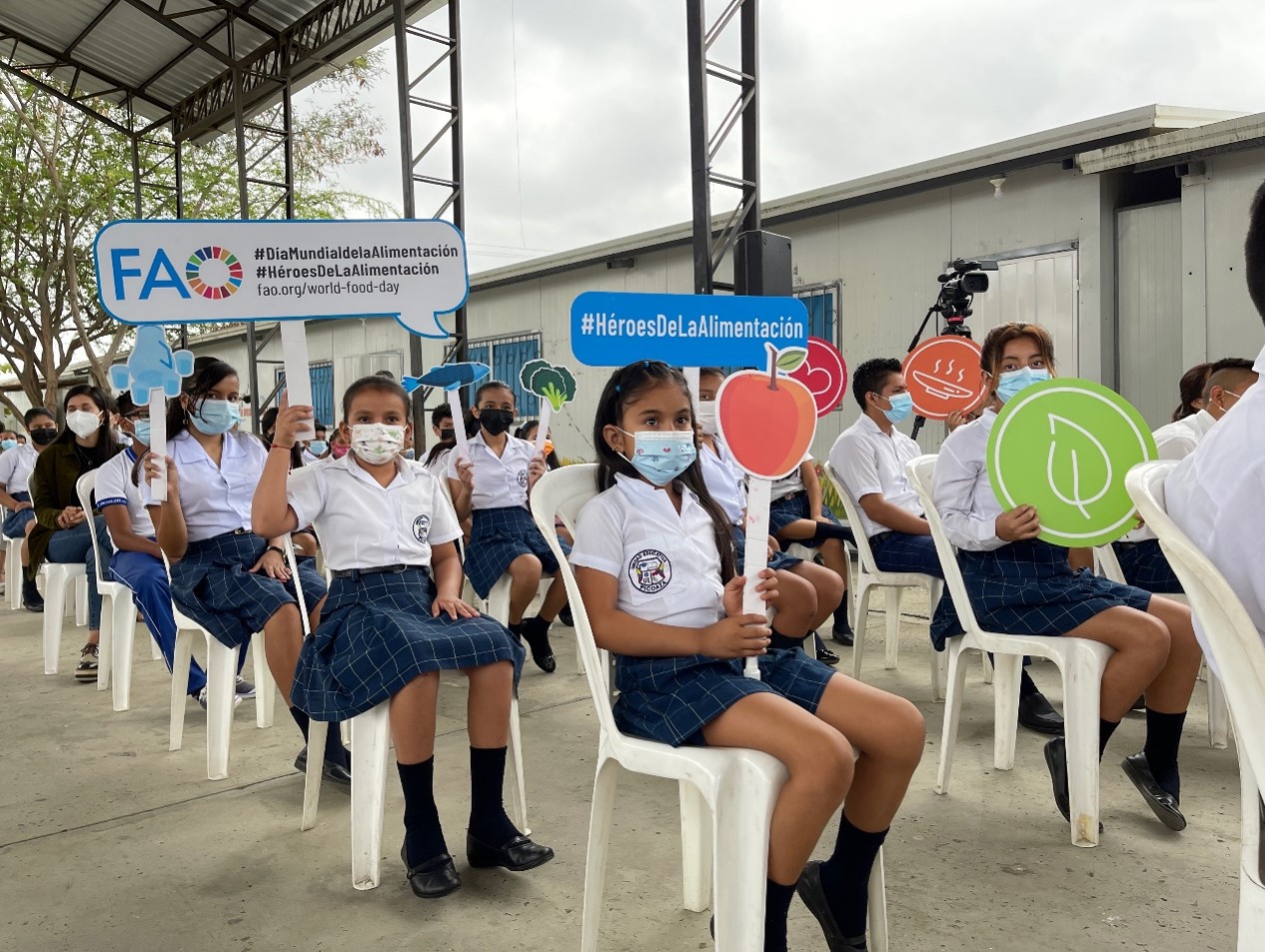Background
Since April 2020, children and adolescents of school age in Ecuador are covered by the Organic Law on School Feeding (LOAE by its Spanish acronym). The LOAE guarantees their right to food and nutrition in a sustainable manner, through the inclusion of natural, fresh and varied food, considering the interculturality of the student population, the revitalization of the local economy and family farming, and incorporating processes of control, participation and permanent co-responsibility of the educational community.
In this context, the Food and Agriculture Organization of the United Nations (FAO) provides technical advice to the Ministry of Education in the redesign of the School Feeding Program (SFP) management model as stipulated in the LOAE. This technical advice is made through the project “Intersectoral policies for Food and Nutrition Security and promotion of healthy eating in Ecuador, COVID-19”. The project contributes to strengthening the role of the State with more robust and sustainable programs and policies, through intersectoral and inter-institutional coordination, to reduce malnutrition, prioritizing the most vulnerable groups in the pandemic, such as the school population.
FAO also contributes to the implementation of the project “Feeding Urbanization”, to strengthen the food systems of Portoviejo county, Province of Manabi. This project aims to make more sustainable, resilient, and inclusive food systems, thus favoring the sovereignty and the Food and Nutrition Security (FNS) of its inhabitants, through the creation of political, social, and institutional conditions that contribute to the eradication of hunger and stimulate the provision and consumption of healthy diets.
Activities carried out
In line with the aforementioned projects, a pilot plan was implemented in the Portoviejo county. This pilot was within the framework of the LOAE and based on the Sustainable Schools methodology, created by the Brazil-FAO International Cooperation Program, with the intention of scaling it up at the national level.
The pilot was carried out from April to December 2021, in 95 urban educational establishments in the Portoviejo county, benefiting 42,688 children and 69 producers of the Peasant Family Farming (PFF).
Methodology
The pilot used the sustainable schools’ methodology, which is based on the premise that schools are privileged spaces for community convergence, and that the social and economic development of people is associated with educational inclusion. Therefore, schools are an enabling environment to overcome poverty, promote food security and health, and should be a reference, not only for education but also for quality and sustainable school feeding (FAO, 2020).
In the Ecuadorian context, the methodology included seven components:
– Intersectoral coordination: this involved intersectoral and inter-institutional coordination among the main local actors involved in the school feeding public policy. It is possible through the establishment of the county intersectoral roundtable, as a working space for coordinating actions to ensure responses aimed at preventing and reducing malnutrition and food insecurity among the school population.
Once the intersectoral roundtable was formed, it is chaired by the Autonomous Decentralized Government of Portoviejo. Then, a Local Action Plan (LAP) was drawn up with representatives of the Ministry of Economic and Social Inclusion, the Ministry of Education, the Ministry of Public Health (MPH), and other relevant actors, which included strategies such as:
a) provision and monitoring of water quality,
b) guarantee and protection of children’s rights,
c) prevention of teenage pregnancy and multiparity,
d) good agricultural and livestock practices through the implementation of community gardens, and
e) promotion and coverage of the prioritized package of health services for pregnant women and children under 5 years of age.
– Social and citizen participation: consisted of the development of general guidelines and the subsequent formation of 93 School Feeding Committees (SFC) in each educational unit, who are considered strategic actors and overseers in the process of delivering school meals, as well as the rest of the pilot actions.
– Food and Nutrition Education – FNE: 226 early education teachers from 70 educational establishments were trained in Ecuador’s Dietary Guidelines (FBDG) so that they can include the topic of healthy eating in their curricular planning and replicate this knowledge to their students. At the same time, 360 professionals from the Ministry of Public Health were trained as FBDG facilitators, so that they can provide appropriate advice on healthy eating. For their part, 26 members of the cantonal intersectoral roundtable also received FBDG training, intending to include activities to promote healthy eating habits in their planning.
– Monitoring of nutritional status: monitoring of nutritional status was carried out in 3,665 preschool children aged 36 to 59 months attending 70 urban educational establishments in the county, to prevent and treat malnutrition problems in good time. The medical and anthropometric assessment carried out by health personnel showed that 86% of preschoolers had a normal nutritional status, 3.9% presented underweight for their age (malnutrition) and 2.9% presented low height for their age (stunted). Meanwhile, 7.9% of children assessed were overweight and obese. A total of 1,685 (46%) children received vitamin A supplementation.
– School infrastructure: a diagnosis of infrastructure, furniture, and human resources was carried out in 95 urban educational establishments in the county through an online survey. From this analysis, it was concluded that most of the schools did not have the appropriate infrastructure to store SFP food and that the toilets required maintenance since due to the COVID-19 pandemic, many of them had deteriorated.
This diagnosis made it possible to identify the most urgent investment needs within schools to improve infrastructure and facilitate the management of storage and delivery of SFP food products, to ensure their quality and safety.
– Healthy snack: the school snack provided by Ministry of Education was complemented with locally produced citrus fruits (mandarins and oranges), to cover the nutritional needs of the schoolchildren for this meal time.
– PFF in public procurement: a program was implemented to strengthen administrative, legal, and logistical capacities aimed at family farmers in the province, so that they can participate and be involved in public procurement processes. As a result, the public company “Manabi Produce” of the Prefecture of Manabi was able to purchase 42,688 rations of fruit from two associations of the PFF, one of which is made up of 90% women. In addition, the purchase of fruit from these farmers had a significant effect on their income, since the monthly profit for each family was USD 459.27, it exceeded the value of the Unified Basic Wage in 2021, set at USD 400.00, which meant a gain of 450%, compared to the market price in the province.
Therefore, the pilot allowed to institutionalize the governance mechanisms of the county and influenced the structuring and implementation of local policy at the social and associative levels. Also, it has the purpose of strengthening the role of the PFF, the consumption of local products, and the articulation between rural and urban areas.
In this way, it contributed to improving the FNS of its inhabitants, especially of the 42,688 schoolchildren who attend educational establishments in the urban area and of the 69 small local producers. It is planned to initiate pilot projects in other territories of the province of Manabi, as well as in other regions of Ecuador, to strengthen and consolidate the model until it is implemented nationwide.
Participating Institutions
Ministry of Education, Ministry of Public Health, Ministry of Agriculture and Livestock, Ministry of Economic and Social Inclusion, Autonomous Decentralized Municipal Government of Portoviejo Canton, Prefecture of Manabi, FAO Ecuador.
Quantitative and qualitative data
- 42,688 students attending educational establishments in the urban area of the canton.
- 69 local small producers benefited.
- Formation of 93 School Feeding Committees (SFC) in each educational unit.
- Through an online survey, diagnosis of infrastructure, furniture, and human resources in 95 urban educational establishments in the canton.
- Monitoring of the nutritional status of 3,665 children aged 36 to 59 months in early education, attending 70 urban educational establishments in the canton.
- A total of 226 early education teachers from 70 educational establishments were trained in Ecuador’s Dietary Guidelines (FBDG).
- 360 health professionals were trained as FBDG facilitators.
- The school snack provided by Ministry of Education was supplemented with locally produced citrus fruits (mandarins and oranges), to cover the nutritional needs of the schoolchildren for this meal time.
Results
- Increased income for local producers (the monthly income for each family was USD 459.27, exceeding the value of the Unified Basic Wage in 2021, set at USD 400.00, which meant a gain of 450%, compared to the market price in the province).
- Improvement of the quality of school meals for more than 40 thousand students.
- School Feeding Committees (SFC) development and better inter-institutional articulation through the formation and activation of the cantonal intersectoral table.
- Local infrastructure diagnosis, with notes on what can be improved to facilitate the management of storage and delivery of SFP food products.
- Nutritional status surveillance of 3,665 children aged 36 to 59 months in early education.
- More than 200 early childhood education teachers trained in the Dietary Guidelines (FBDG) of Ecuador.
- More than 300 health professionals trained as FBDG facilitators.
- A better understanding of the Sustainable Schools methodology, its benefits, and its replicability in other regions of the country.
Progress and challenges
Advances:
- Increased income for local producers.
- Program to strengthen administrative, legal, and logistical capacities for family farmers in the province,
- Improvement of food and nutrition security at the cantonal level.
- Improvement of the quality of school meals for more than 40 thousand students.
- Formation of School Feeding Committees (SFC) and better inter-institutional articulation through the formation and activation of the cantonal intersectoral table.
- Diagnosis of local infrastructure and notes on what can be improved to facilitate the management of storage and delivery of SFP food products.
- Follow-up of the nutritional status of thousands of children aged 36 to 59 months in early education.
- More than 200 early childhood education teachers trained in the Dietary Guidelines (FBDG) of Ecuador.
- More than 300 health professionals trained as FBDG facilitators.
- A better understanding of the Sustainable Schools methodology, its benefits, and its replicability in other regions of the country.
- Institutionalization of the canton’s governance mechanisms.
- Advocacy in the structuring and implementation of local policy at the social and associative level.
Challenges
Change of national authorities
In May 2021, there were changes in executive and legislative authorities. To mitigate a potential risk of lack of continuity of the issues addressed by the pilot, it was counted on:
- Pre-election political agenda in which candidates were sensitized to the issues addressed in the FNS, including the SFP.
- LOAE supports the SFP budget without affecting the coverage of the population’s demand for care.
- Tenure of local authorities until 2023.
- Cantonal intersectoral roundtable activated and underway.
- Socialization and sensitization of the pilot to newly elected and incumbent executive authorities.
Health pandemic
The pilot was implemented during the context of the COVID-19 pandemic, which is why students did not attend classes in person at the educational institutions. In this context, some actions had to be adjusted or modified:
- Twenty-three health facilities were assigned to conduct a nutritional status surveillance of children aged 36-59 months.
- The school snack and fruit ration were given to mothers and fathers.
- Some schools formed the School Feeding Committees with only teachers and parents.
- No school gardens were implemented, but teacher training in FBDG was strengthened through a virtual platform.
Local agricultural production
The challenges identified in the inclusion of fresh food within the SFP were:
- Weak inter-institutional articulation and coordination (Ministry of Agriculture, Ministry of Education, National Public Procurement Service, Autonomous Decentralized Governments).
- Implementation of purchasing processes.
- Limited budget and human resources.
- Absence of an updated database of associations with information on supply, seasonality, quantity, price, etc.
- Distribution, storage, and delivery logistics, so that the fruit arrives in optimal condition to the target population and prevents food waste.
In this context, the public company Manabí Produce of the provincial government of Manabi, purchased fruit (oranges) using the “Specific Business Turn” mechanism. This procurement mechanism allows for the direct purchase of fresh food from PFF actors, shortening contracting times and speeding up payment to suppliers.
